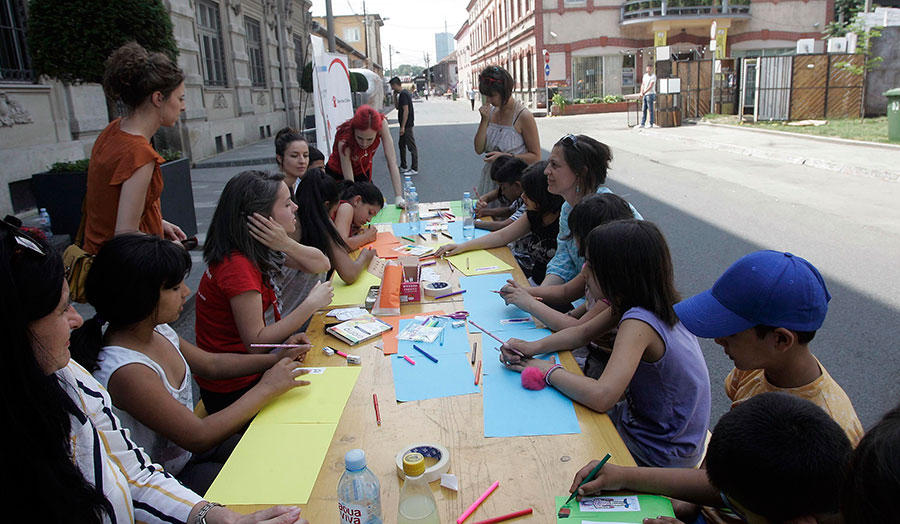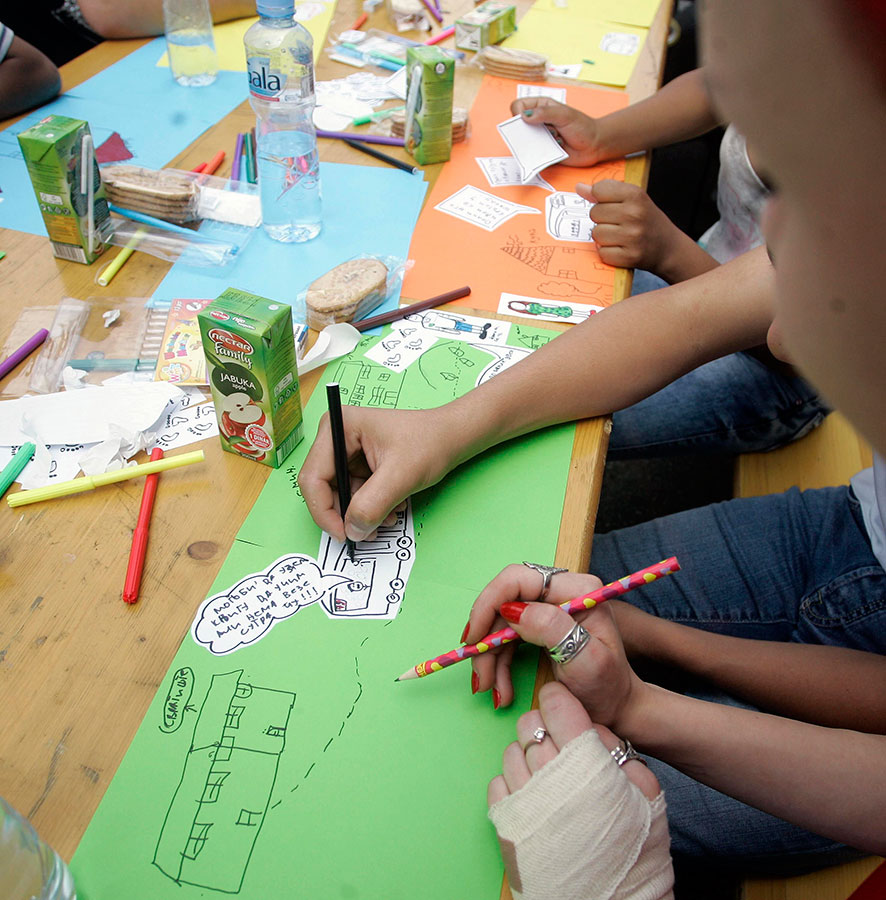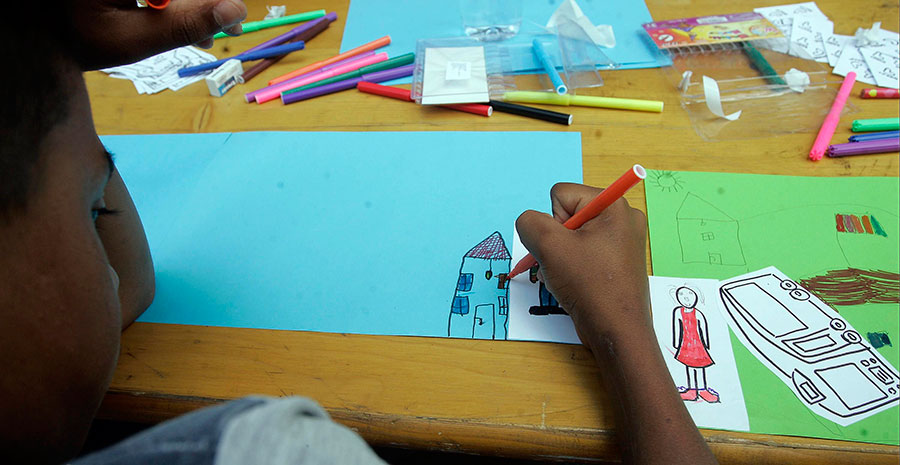Within the 8th edition of Mikser Festival “Sensitive society,” on Saturday, 11 June, a workshop named “Map of children on the move” was held with the aim of bringing refugee and migrant children and children who are living or working on the streets in Belgrade closer together.
This workshop was facilitated by educators from the project implemented by Centre for Youth Integration in partnership with the organisation “Save the Children” at Miksaliste, as well as by educators and volunteers from the Shelter for street involved children. The workshop was also participated in by migrant and refugee children and children beneficiaries of the Shelter for Children involved in the life and / or work on the street.
The theme of the workshop was the creation of interactive maps, the concept which allows refugee and migrant children to share experiences of their journey to Serbia through playing. The map starts in the country of child’s origin and follows the way to Serbia and farther to the desired destination. This structure allows a child to choose travel details to tell, without any pressure and in a creative way, but also to choose way to express themselves – through drawing, text or using symbols. This is how children can share their hardest experiences without any pressure. The details children share through the maps are of a great importance to professionals who are working with them in order to provide adequate assistance and support. Trough map creation, children also receive information about potential risks they may face on their journey as well as rules and services available to them during travel.
 Workshop within the Mikser Festival included children who live and/or work on the streets of Belgrade, thereby creating an opportunity for a comprehensive exchange of experiences among children hailing from two different backgrounds and allowing them to connect these backgrounds while respecting the principles of multiculturalism.
Workshop within the Mikser Festival included children who live and/or work on the streets of Belgrade, thereby creating an opportunity for a comprehensive exchange of experiences among children hailing from two different backgrounds and allowing them to connect these backgrounds while respecting the principles of multiculturalism.
Head of Section 1 of the Delegation of the European Union Nicolas Bizel attended the event and greeted the children, pointing out he was happy be there to see how EU funded projects made a difference in everyday life. “Today’s activity brings together Svratiste and Mikser Festival, both of which are financially supported by the EU. This activity is very important as it brings together children from two different but actually very similar contexts, children who live and are forced to work in the streets of Belgrade and refugee children who have also lost their home. Today they get an opportunity to connect and make friends. Through this activity we support the initiative of Mikser Festival to integrate refugees and connect them with Serbian citizens, in this case the youngest citizens. This is a great initiative as it focuses on the protection of children. For the EU, the protection and promotion of children rights is a basic human right and one of our core objectives,” Bizel said.
He also said the EU Delegation to Serbia “supports both Serbian government and civil society organisations to work towards achieving better observance children rights and will continue to do so in the future. In that context, I am very pleased that the EU was able to fund Svratiste’s project for children involved in life or work on the street. This one of the 28 projects supported by the EU through a comprehensive programme called “EU support to inclusive society” implemented by the EU Delegation in cooperation with the Ministry of Labour. Our goal is to increase social inclusion by supporting local actions throughout Serbia,” Bizel said.
 On the other hand, Bizel noted, “the EU is also providing continuous support to Serbia in dealing with migration crisis. Since 2015, we have made available over EUR30 million to Serbia in the form of both short term humanitarian assistance and long term assistance aimed at the development of an efficient system for asylum and migration”.
On the other hand, Bizel noted, “the EU is also providing continuous support to Serbia in dealing with migration crisis. Since 2015, we have made available over EUR30 million to Serbia in the form of both short term humanitarian assistance and long term assistance aimed at the development of an efficient system for asylum and migration”.
Director of “Save the Children” in Serbia Nevena Milutinovic said that “interactive maps enable us to share experience. We think it is important that, through the joint creation of Maps, refugee children can share their experiences with children from Serbia, whose experience also entails living on the move, everyday risks and uncertainty. We should always bear in mind the importance providing them with support in dealing with such experiences”.
Centre for youth integration, being the direct implementing partner of the organisation “Save the Children,” has since October 2015 been actively supporting refugee and migrant children in Miksaliste as an urgent response to the refugee crisis.
Also, the Centre for youth integration implements a project funded by the European Union “Drop in shelter for street involved children in Belgrade” which supports children who are living and/or working on the street. This activity is part of the project “European Union Support to Inclusive Society,” funded by the EU with EUR5.4 million, and implemented by the Delegation of the European Union to the Republic of Serbia in cooperation with the Ministry of Labour, Employment, Veteran and Social Affairs.
Project “European Support to Inclusive Society”, funded by the European Union with 5.4 million Euros, has the aim to ensure greater social inclusion of vulnerable groups in Serbia, such as elderly citizens, children, members of minority groups, including Roma men and women, and others. The EU has awarded through the project the amount of 4.3 million Euros in 28 grants, which will be implemented in 36 cities and municipalities in Serbia by 2017. Projects, implemented by the republic and provincial social protection institutions, towns and municipalities, centres for social work, associations of citizens, foundations, educational institutions and public companies, will increase the scope and quality of services at local level in the area of social protection and healthcare, housing, education and employment, thus strengthening social inclusion of vulnerable groups.
The Project is implemented by the European Union Delegation in the Republic of Serbia in collaboration with the Ministry of Labour, Employment, Veteran and Social Affairs.
For more information about the Project, please refer to www.socijalnainkluzija.rs




